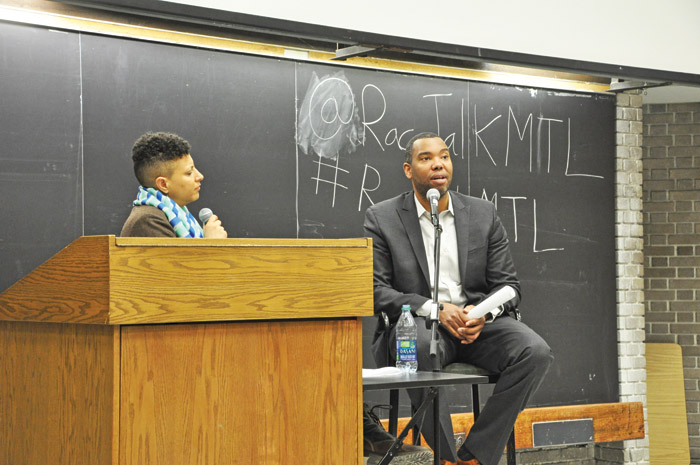Ta-Nehisi Coates, senior editor at The Atlantic, spoke at McGill on March 6 about the state of race relations in the United States. The talk was organized by groups including the McGill Debating Union (MDU), McGill Black Students’ Network (BSN), Women of Colour Collective at McGill Law School, and Media @ McGill.
The talk was moderated by Rachel Zellars, a Ph.D. student at McGill who is currently studying critical race theory and met Coates when they were both undergraduate students at Howard University.
Coates spoke extensively about how events in the past year motivated for him to write an essay addressed to his 14-year-old son. The deaths of black Americans Michael Brown and Eric Garner at the hands of the police in Ferguson, Missouri and New York City, respectively, were decried by the public on the account of being racially motivated. The events sparked protests against police brutality, institutionalized discrimination, and economic inequality throughout 2014.
“I thought about all the young black folks in America, in an era of Trayvon Martin, in an era of Renisha McBride, in an era of Jordan Davis, in an era of Michael Brown, in an era of plunder, and in an era of Obama, trying to make sense out of their world, and I remember how confused I was,” Coates said, listing other black people who died after being attacked by the police. “It was just the most painful feeling to not know what was going on.”
Coates explained that the protests and public outcry were encouraging, but the experience of seeing black persons being attacked by the police was not a surprise to him. Coates’ essay sought to help his son understand why his son cannot afford to be shocked.
“Americans believe in what historian Barbara Fields has helpfully dubbed ‘racecraft’,” Coates read from his letter. “The idea that race is a defined, indubitable feature of the natural world, and from this unalterable condition, we derive racism as a natural by-product, an innate need to reduce and destroy those who are darker or lighter than us [….] But race flows from racism, not the other way around. And the desire to be white has never been so much a matter of genealogy or physiognomy, as hierarchy.”
On Nov. 24, a grand jury decided not to indict Darren Wilson, the officer who shot and killed Brown in Ferguson. Coates read the portion of his essay where he recounted how he spoke to his son after the decision.
“The men who left [Michael Brown’s] body on the street, like some awesome declaration of their inviolable power […] I had known these men would go unpunished from the moment I heard Michael Brown’s name,” he said. “What I told you is what your grandparents tried to tell me: That this is your country, that this is your world, that this is your body, and you must find some way to live within this world, and within this body.”
Coates went on to distinguish differences between the upbringings of white children and black children, asserting that black children typically live in households with lower socioeconomic means and are exposed to more violence than white children.
Furthermore, Coates argued that the use of academic discussions of racism should not diminish the visceral effect of violence that is being perpetrated by society. Coates argued that one cannot disassociate the violence inherent in racism through academic language, as it takes away from the everyday violence that many black people deal with in numerous aspects of their lives.
“[The violence] compounds—everything about you, how you dress, how you carry yourself, how you laugh, what you laugh at, what you say, what you don’t say,” he said. “I came to understand that my country was a galaxy, my portion was black.”
Denizhan Ukyur, U3 Management and president of the McGill Debating Union, found that Coates’ talk was effective and powerful.
“The effects of racism feel distant to a lot people [….] The emotions people feel are hidden behind words, facts, and technicalities,” Ukyur said. “He brought the visceral emotions of violence that people are feeling into the imagination of people who don’t necessarily have the connection that other people do.”
Isabelle Oke, U1 Arts and political coordinator for the BSN, mirrored those feelings.
“His point about violence, where he was saying that there are a lot of people who look down on protesters—but because of its relation to violence and the language we use to distance ourselves from actual violence that happens to actual violent people strongly stuck with me,” she said.
Alex Langer, a U3 Arts student, expressed that Coates presented a powerful message.
“What [Coates] does so well […] is taking something that you know is there, kind of formed in the back of your head,” he said. “He just spells it out and expresses things that everybody knows but doesn’t know in a simple, beautiful, clear, and concise way that just makes [everyone] understand.”









